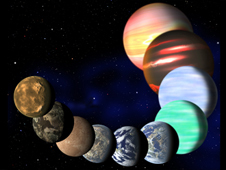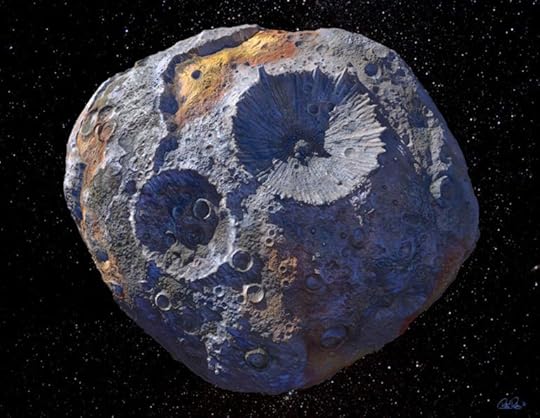Michael J. Behe's Blog, page 489
April 28, 2019
Satellite DNA is Essential and Species-Specific in Drosophila melanogaster
This week’s “we thought it was junk but it turned out to be crucial” study comes with the added bonus that the so-called “junk” is also species-specific / taxonomically restricted. The general topic is tandemly repeated satellite DNA in the much studied fruit fly, Drosophila melanogaster. These satellite DNA regions comprise 15-20% of D. melanogaster’s genome, and one of the regions, AAGAG(n), is transcribed across many of D. melanogaster’s cell types. … read more
Copyright © 2019 Uncommon Descent . This Feed is for personal non-commercial use only. If you are not reading this material in your news aggregator, the site you are looking at is guilty of copyright infringement UNLESS EXPLICIT PERMISSION OTHERWISE HAS BEEN GIVEN. Please contact legal@uncommondescent.com so we can take legal action immediately.
Plugin by Taragana
Researchers: Rise in “religious Nones” masks growth in evangelicalism
Last week, we looked at a recent pollster’s finding that the number of Religious Nones was decreasing. Given that the main losses were due to the collapse of mainline denominations, it’s unclear, we suggested, how much is decline in belief and how much is decline in social ties
Sociologist of religion Rodney Stark and others offer some answers:
“The entire change [toward none-ness] has taken place with the non-attending group.” “In other words,” he adds, “this change marks a decrease only in nominal affiliation, not an increase in irreligion.” Stark says the wealth of data he has studied, as well as that his peers have, “does not support claims for increased secularization, let alone a decrease in the number of Christians. It may not even reflect an increase in those who say they are ‘nones.’” …
Some very recent research conducted jointly at Harvard and Indiana University supports Pew’s conclusion. These sociologists of religion find that the apparent growth of the nones is “solely a function of the decline in moderate religion.” Glenn T. Stanton, “No, Non-Believers Are Not Increasing In America” at The Federalist
And get this:
The Harvard/Indiana University researchers found the same thing, explaining “evangelicals are not on the decline” but “grew from 1972 when they were 18 percent of the population, to a steady level of about 28 percent” from the late 1980s to the present. This “percentage of the population” measure is very significant because it shows not only growth in terms of real numbers, but enough growth to keep up with or even exceed the rate of population growth. That’s not nothing. Glenn T. Stanton, “No, Non-Believers Are Not Increasing In America” at The Federalist
Atheists have also grown from 1.6% of the adult population to 3%, which is a significant increase. But the smaller the starting number, the easier it is for any increase to be significant. It certainly won’t save Darwinism.
Hat tip: Philip Cunningham
Follow UD News at Twitter!
See also: For the first time, “No Religion” is the most popular choice for Americans. People who, forty years ago, would have cited the church their parents once attended as their “religion” now say “no religion.” That’s probably because, in current urban society, they no longer experience social penalties for being honest. It’s still a decline but to discuss it intelligently, we need to see clearly what it is a decline in.
Copyright © 2019 Uncommon Descent . This Feed is for personal non-commercial use only. If you are not reading this material in your news aggregator, the site you are looking at is guilty of copyright infringement UNLESS EXPLICIT PERMISSION OTHERWISE HAS BEEN GIVEN. Please contact legal@uncommondescent.com so we can take legal action immediately.
Plugin by Taragana
Jay Richards: New evangelical statement on AI avoids major pitfalls
 Jay Wesley Richards
Jay Wesley RichardsIncluding irrelevance:
For a Christian statement on AI, this approach is exactly right. Far too much of the public conversation about artificial intelligence proceeds as if we can and should suspend our judgment about human beings. But what sense does it make to talk about artificial intelligence unless we grasp what it means to be intelligent in the first place? …
Although the Statement nowhere distinguishes between “weak” and “strong” AI, the signers are clearly (and rightly) skeptical that computers can become conscious moral agents. Article 3, for instance, says that “technology is incapable of possessing the capacity for moral agency or responsibility.” …
I wondered why the document was released just now, so I asked Mark Tooley why he signed it. “AI is strong and will become a stronger factor in human life for all civilization, so Christians must address it in their social witness,” he told me. “If the church doesn’t offer ethical guidelines, who will? The most pressing issue is maintaining the unique God-ordained value of the human person. Many will inevitably exploit AI to diminish the sacredness of human life and will stress intelligence and capability as defining values versus the divine image on each man and woman. The challenges of AI offer an opportunity for Christians to emphasize what makes persons unique and irreplaceable in creation.” Jay Richards, “New Evangelical Statement on AI is Balanced and Well-Informed” at Mind Matters News
See also: Jay Richards: In an information economy, the human person will be at the very center
Note: Jay Richards is also author with Guillermo Gonzalez of The Privileged Planet, abut fine-tuning of Earth and the universe.
Follow UD News at Twitter!
Copyright © 2019 Uncommon Descent . This Feed is for personal non-commercial use only. If you are not reading this material in your news aggregator, the site you are looking at is guilty of copyright infringement UNLESS EXPLICIT PERMISSION OTHERWISE HAS BEEN GIVEN. Please contact legal@uncommondescent.com so we can take legal action immediately.
Plugin by Taragana
The day Stephen Hawking undercut the multiverse
Stephen Hawking had for many years considered the idea that “black holes are birthing centers for Star Trek phenomena like wormholes, time tunnels and multiple universes.”
You could stuff any concept you wanted into a black hole. But in 2004, he turned on the idea:
Speaking at an international conference in Dublin, Ireland, Hawking said that he was wrong about his 30-year assertion that material entering a black hole leaves our universe…
Dr. Hawking said his new calculations debunk what he and others had speculated. In a dream-squashing conclusion, Hawking emphasized, “I’m sorry to disappoint science fiction fans, but if [mass and energy] is preserved [as required by the laws of physics] there is no possibility of using black holes to travel to other universes.”
His peers were unsettled. Reflecting the thoughts of many in the audience, University of Chicago physicist Robert Wald responded, “He’s running away from what we still believe.” The angst in Wald’s remark is palpable.
Stephen Hawking’s announcement was a warning that the multiverse and, with it, philosophical naturalism is in trouble. Regis Nicoll, “The Day Stephen Hawking Unsettled His Atheist Peers” at Crisis magazine
No question, naturalism (nature is all there is), often called “materialism,” is in trouble. On many fronts. Whether it’s the multiverse in physics or Darwinism in biology or any number of things in between, things aren’t working out like they were supposed to.
Just as well for science. The multiverse is science’s assisted suicide. Looks like the Samaritans are still answering their phone.
See also: Sabine Hossenfelder on the flight from falsifiability Hossenfelder is right to be concerned. Some cosmologists would like to dump falsifiability as a criterion. If they could, they would remove an obstacle to demanding public belief in ideas like the multiverse, ideas that cannot be falsified.
and
How naturalism rots science from the head down
Copyright © 2019 Uncommon Descent . This Feed is for personal non-commercial use only. If you are not reading this material in your news aggregator, the site you are looking at is guilty of copyright infringement UNLESS EXPLICIT PERMISSION OTHERWISE HAS BEEN GIVEN. Please contact legal@uncommondescent.com so we can take legal action immediately.
Plugin by Taragana
The BBC on “how religion evolved”

Generally, speaking, as usual, Darwinian concepts prove of anything, everything, and nothing, which makes them perfect for dissemination on increasingly irrelevant tax burdens like the BBC. On the subject of Catholics and holy communion, for example, a BBC journalist suggests it started as food-sharing among ape-like creatures (that’s not at all the recorded history of the Christian rite of holy communion but never mind):
The author, journalist Brandon Ambrosino, wanders off into a discussion as to whether religion is an adaptation or a spandrel. Does belief in God arise because it helps us in the struggle for reproductive fitness (“Don’t use that birth control, honey!”) or because, while it is adaptatively neutral, it is linked to adaptation (“I met a really cute girl at Mass today!”). Of course, if Darwinism is true, how is one to know? “Natural selection” has no mind and thus no purposes, and adaptation is really just the consequence of internal biological constraints and natural history.
So evolutionary “research” is just story time, not much different from fables told to children except that you (the taxpayers) pay for the stories. The meter is always running… Michael Egnor, “How Did Religion “Evolve”?” at Evolution News and Science Today:
The BBC demonstrates its independence from its funding sources by sponsoring stuff no one would pay for if they were not compelled to do so by law.
It’s telling that one kind of evolution always seems to be missing from these “theories” about the evolutionary origins of religion. How did atheism evolve? Surely godlessness had its origins in neocortices of impious apes. Why did some apes evolve to become materialists, Darwinists and atheists? It certainly seems maladaptive — it’s doubtful that contemplating the Origin of Species makes you more fecund. Michael Egnor, “How Did Religion “Evolve”?” at Evolution News and Science Today:
Statistically, atheism functions as an efficient form of birth suppression but—of course— a Darwinian explanation can be found for that too.
Follow UD News at Twitter!
See also: Michael Egnor: Apes are NOT spiritual beings
and
Free Will: One Woman’s Left Hand Seemed To Have A Mind Of Its Own.Did It?
Michael Egnor is a neurosurgeon, professor of Neurological Surgery and Pediatrics and Director of Pediatric Neurosurgery, Neurological Surgery, Stonybrook School of Medicine
Copyright © 2019 Uncommon Descent . This Feed is for personal non-commercial use only. If you are not reading this material in your news aggregator, the site you are looking at is guilty of copyright infringement UNLESS EXPLICIT PERMISSION OTHERWISE HAS BEEN GIVEN. Please contact legal@uncommondescent.com so we can take legal action immediately.
Plugin by Taragana
April 27, 2019
Jerry Coyne insists that secular humanism is not a religion
It sounds as though the Darwinian biologist is confusing “religion” with “theism”:
The latest false analogy between religious and nonreligious belief systems is John Staddon’s essay “Is Secular Humanism a Religion?” for Quillette. Staddon’s answer is “Yes,” but his reasoning is bizarre. One would think that it should be “Clearly not” for, after all, “secular” means “not religious,” and secular humanism is an areligious philosophy whose goal is to advance human welfare and morality without invoking gods or the supernatural.Jerry Coyne, “Secular Humanism is Not a Religion” at Quillette
If Jerry Coyne thinks he is advancing human welfare and morality at all, he is involved in some kind of religion. The word means “to tie together,” that is to tie people to the universe, to each other, to their ultimate fate, etc. He spends so much time attacking other people’s religion, he can only be doing it on behalf of his own; a genuinely irreligious person does not care.
Follow UD News at Twitter!
See also: Jerry Coyne on hwo mathematician John Lennox embarrasses himself
Neurosurgeon Michael Egnor has become Jerry Coyne’s “archenemy”
and
Jerry Coyne discovers the lack of intellectual freedom on campus
Copyright © 2019 Uncommon Descent . This Feed is for personal non-commercial use only. If you are not reading this material in your news aggregator, the site you are looking at is guilty of copyright infringement UNLESS EXPLICIT PERMISSION OTHERWISE HAS BEEN GIVEN. Please contact legal@uncommondescent.com so we can take legal action immediately.
Plugin by Taragana
Researcher: Why finding extraterrestrial life “now seems inevitable,” maybe soon
 types of planets Kepler found/NAA
types of planets Kepler found/NAAHe cites a string of remarkable discoveries:
While life is a special kind of complex chemistry, the elements involved are nothing special: carbon, hydrogen, oxygen and so on are among the most abundant elements in the universe. Complex organic chemistry is surprisingly common.
Amino acids, just like those that make up every protein in our bodies, have been found in the tails of comets. There are other organic compounds in Martian soil.
And 6,500 light years away a giant cloud of space alcohol floats among the stars … A second independent “tree of life” would mean that the rapid appearance of life on Earth was no fluke; life must abound in the universe.
It would greatly increase the chances that, somewhere among those billions of habitable planets in our galaxy, there could be something we could talk to… Cathal D. O’Connell, “Why the idea of alien life now seems inevitable and possibly imminent” at The Conversation
O’Connell sets out a great deal of evidence for the possibility of life but, of course, the reality is that “something we could talk to” is the real prize. Bacteria on Jupiter’s moon Europa or on an exoplanets would be a sensation for a couple of years but if nothing of greater significance followed for decades … well… life goes on.
He ends with, “The ancient question ‘Are we alone?’ has graduated from being a philosophical musing to a testable hypothesis. We should be prepared for an answer.”
Actually, our culture has buzzed about the possibility, waiting for an answer, for decades; some of us remember it from the Fifties. So it’s worth asking another question: What if, after decades of research, no answer comes? What would that change?
Follow UD News at Twitter!
See also: Faint hopes easily revived: Life may be evolving on closest exoplanet
Forbes cosmology commentator: Maybe we ARE alone
Still no space aliens? That’s because they are keeping us in a zoo!
and
Tales of an invented god
Copyright © 2019 Uncommon Descent . This Feed is for personal non-commercial use only. If you are not reading this material in your news aggregator, the site you are looking at is guilty of copyright infringement UNLESS EXPLICIT PERMISSION OTHERWISE HAS BEEN GIVEN. Please contact legal@uncommondescent.com so we can take legal action immediately.
Plugin by Taragana
Did life get started on planetesimals before Earth formed?
 Artist’s concept of the asteroid 16 Psyche/SSL, ASU, P. Rubin, NASA, JPL-Caltech
Artist’s concept of the asteroid 16 Psyche/SSL, ASU, P. Rubin, NASA, JPL-CaltechPlanetesimals (minute planets that might come together to form a larger one) might have had all the building blocks of life, according to an Arizona State University planetary scientist:
And clement conditions may have persisted inside some planetesimals for tens of millions of years — perhaps long enough for life to emerge, said [Lindy] Elkins-Tanton, the director of ASU’s School of Earth and Space Exploration and the principal investigator of NASA’s upcoming mission to the odd metallic asteroid Psyche…
Life as we know it requires three main ingredients: liquid water, organic molecules and an energy source. Planetesimals, which formed within 1.5 million years of the solar system’s birth, likely featured all three, Elkins-Tanton said. Mike Wall, “Life May Have Evolved Before Earth Finished Forming” at Space.com
This sounds like hype for the Psyche project. But she has a point: Not all planetesimals were necessarily involved in catastrophic collisions.
“This is meant to be just a kind of a thought problem for us all to consider,” Elkins-Tanton said. “Could life actually have arisen on planetesimals? Could there be evidence for life in meteorites that we have not known to look for? And if this is so, how could they have been spread through the solar system — and many, many unanswerable implications of that possibility.”Life May Have Evolved Before Earth Finished Forming” at Space.com
We’re quite happy to consider it, Dr. Elkins-Tanton. But then we must also consider this: If life got started so quickly back then—and there is no evidence of it ever just getting started somehow, time after time, since then—either life was an event triggered from outside nature as we know it or it was implicit in the Big Bang (but that would point to some kind of encoded information). In a finite universe, the closer we get to the beginning of things, the more evident this problem becomes.
Follow UD News at Twitter!
See also: Globally famous chemist James Tour on the origin of life
Researchers: Origin of life more likely in ponds, assisted by lightning, than oceans
NASA Recreates The Origin Of Life And It’s Totally Shocking What’s shocking, in this case, is the hype.
Ancient Cataclysms And Modern Conflicts In Origin Of Life Studies
The Science Fictions series at your fingertips – origin of life What we do and don’t know about the origin of life.
Copyright © 2019 Uncommon Descent . This Feed is for personal non-commercial use only. If you are not reading this material in your news aggregator, the site you are looking at is guilty of copyright infringement UNLESS EXPLICIT PERMISSION OTHERWISE HAS BEEN GIVEN. Please contact legal@uncommondescent.com so we can take legal action immediately.
Plugin by Taragana
Robert J. Marks: Do robots make better decisions?

And other topical takes on news about intelligence:
HEADLINE | BBC chief accuses Netflix of failing to take risks because its decisions are made by robots (The Telegraph)
Ever scroll through Netflix and not see anything interesting enough to watch? According to the BBC, Netflix has an “insatiable greed for data-gathering.” Those without experience who wade through data analytics will often stub their toes when interpreting results. “Where [Netflix is] led by algorithm[s], we [the BBC] need to be led by pure creativity.”

They might have a point. Consider zombies. The successful series The Walking Dead (2010–) spawned the offshoot series Fear the Walking Dead (2015–). This further success gave rise to the Netflix series Z Nation (2014-2018) and then, most recently, Black Summer (2019–). The common theme of all these programs is fleeing zombies in a dystopian future. How unoriginal.1
And as we repeatedly note at Mind Matters News, algorithms—including the ones used by Netflix—can’t be creative. More.
Follow UD News at Twitter!
Computer engineering prof Robert J. Marks is one of the authors of Introduction to Evolutionary Informatics
Copyright © 2019 Uncommon Descent . This Feed is for personal non-commercial use only. If you are not reading this material in your news aggregator, the site you are looking at is guilty of copyright infringement UNLESS EXPLICIT PERMISSION OTHERWISE HAS BEEN GIVEN. Please contact legal@uncommondescent.com so we can take legal action immediately.
Plugin by Taragana
Sabine Hossenfelder on the flight from falsifiability

Particle physicist Sabine Hossenfelder, author of Lost in Math: How Beauty Leads Physics Astray, comments on the current state of falsifiability in particle physics, which is not good:
Troubles begin if scientists attempt to falsify principles by producing large numbers of models that all make different predictions. This is, unfortunately, the current situation in both cosmology and particle physics. It documents that these models are strongly underdetermined. In such a case, no further models should be developed because that is a waste of time. Instead, scientists need to find ways to arrive at more strongly determined predictions. This can be done, eg, by looking for model-independent predictions, or by focusing on inconsistencies in the existing theories.
This is not currently happening because it would make it more difficult for scientists to produce predictions, and hence decrease their paper output. As long as we continue to think that a large number of publications is a signal of good science, we will continue to see wrong predictions based on useless models. Sabine Hossenfelder, “Yes, scientific theories have to be falsifiable. Why do we even have to talk about this?” at BackRe(Action)
Hossenfelder is right to be concerned. Some cosmologists would like to dump falsifiability as a criterion. If they could, they would remove an obstacle to demanding public belief in ideas like the multiverse, ideas that cannot be falsified because there is no evidence for them. But many cosmologists need implicit faith in such ideas to hold their theories together and perhaps to keep getting funded.
And that is why we “even have to talk about this.”
Note: Cosmologist Adam Becker, the one who had a bee in his bonnet about Inference Review, doesn’t seem to be a fan of falsification.
See also: Sabine Hossenfelder: Has The Large Hadron Collider “broken physics”?
Sabine Hossenfelder: Can gravitational wave interferometers tell us if we live in a hologram universe?
and
Do science hero stories stand in the way of progress?
Hey, here she is:
Follow UD News at Twitter!
Copyright © 2019 Uncommon Descent . This Feed is for personal non-commercial use only. If you are not reading this material in your news aggregator, the site you are looking at is guilty of copyright infringement UNLESS EXPLICIT PERMISSION OTHERWISE HAS BEEN GIVEN. Please contact legal@uncommondescent.com so we can take legal action immediately.
Plugin by Taragana
Michael J. Behe's Blog
- Michael J. Behe's profile
- 219 followers



